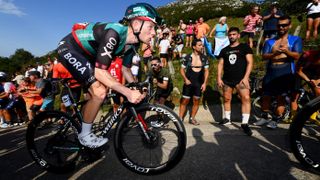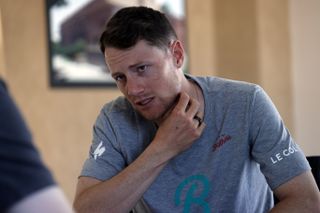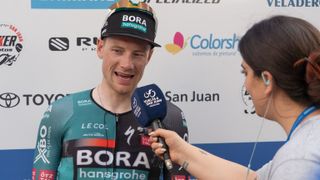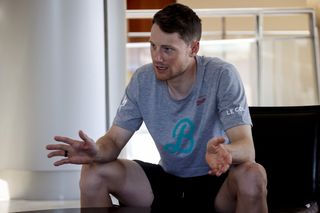‘You can’t really do this sport if you’re not robust’ – Sam Bennett interview
In contemporary cycling, where every watt and every gram have to be accounted for, bunch sprints continue to exist in a place pleasingly beyond measurement. Somewhere in the final kilometre, calibration gives way to a form of divination. Teams draw up detailed schemes for their sprint trains, but victory usually owes more to a rare form of alchemy than to precision engineering.
So how often does a plan actually work? “Oh, nearly never,” Sam Bennett laughs.
It’s January, and Bennett is sitting in the corridor of a hotel in San Juan on the eve of his first race of the season, content to have a full winter of training behind him after his injury troubles of last year. His key lead-out men Danny van Poppel and Ryan Mullen have made the journey to Argentina with him, reconnoitring the relevant parts of the course and poring over images of finishing straights. Everybody knows the plan and they know, too, that it probably won’t survive much contact with their rival trains. But that’s when the fun truly begins.
“I don’t care if someone else is quicker or has more power or more punch, the only thing you have to do is get to the line first, so you just have to figure it out as it goes,” Bennett tells Cyclingnews. “I don’t know how I’m going to do it beforehand, but when you’re fit enough, you’re able to think clearer, you’re always in the right position and you’re able to make it happen. I know who’s faster than me, but that doesn’t mean they’re going to beat me.”
Two days later, Bennett lands his first victory of 2023 at the first attempt, after Mullen and Van Poppel pilot him to the finishing straight and he unleashes a searing finish. It rarely comes off that smoothly, and he will endure near misses for the rest of the week, but trial and error is all part of the game, especially at this time of the year.
“As a climber, you can’t accidentally win a mountaintop finish, you either have it or you don’t. But as a sprinter, you can be better at positioning, maybe you can go longer than others, maybe you can kick harder… You just have to figure it out. It is like chess on wheels,” Bennett says.
“But the thing is, it’s hard to do that on the limit and I think that’s what separates the good guys from the average guys: they’re able to figure it out when they’re on the absolute limit and make it work.”
“I think people think I’m a certain way because I have a soft demeanour, I never come across as too arrogant. But you can’t really do this sport if you’re not a bit more robust than that…”
By his own admission, Bennett spent much of last season struggling to make it work. Every time he seemed to build up a head of steam, a new obstacle would sprout up around the corner. His return to Bora-Hansgrohe should have been a liberation after an unhappy end to his spell at QuickStep, but he was limited by injury early in the campaign and ultimately omitted from the Tour de France team.
At that point, Bennett had already been through a year of hardship. Twelve months earlier, the knee issues that forced him to miss that same race had precipitated his acrimonious departure from QuickStep, whose manager Patrick Lefevere seemed intent on using Bennett’s docile nature against him in the court of public opinion. In an escalating sequence of outbursts across the summer, Lefevere repeatedly questioned the Irishman’s resolve, dismissing him as “the pinnacle of mental weakness.”
It’s tempting to imagine how frankly certain fast men of yesteryear would have responded to such provocation, but Bennett has always been a somewhat atypical sprinter. Rather than defend himself in public, he opted to hold his counsel, but silence shouldn’t be mistaken for fragility.
“I still owe a lot to that team, so I don’t look into it too much,” Bennett insists now. “I think people think I’m a certain way because I have a soft demeanour, I never come across as too arrogant. I suppose in Ireland, you’re never allowed to say, ‘I’m good,’ it’s always, ‘I’m hanging in,’ or whatever. But you can’t really do this sport if you’re not a bit more robust than that, like… That stuff won’t get to you.”
Bennett has always been tougher than he let on. Take 2009, when he made his debut in the Rás Tailteann, Ireland’s week-long national tour, as a callow 18-year-old who combined bike racing on the weekend with his studies at Waterford IT.
The terrible beauty of the Rás is that the peloton is composed of part-time domestic riders and seasoned professionals from the Continent, a contingent which that year included former Tour de France maillot jaune Jaan Kirsipuu, in his 40th year but still crunching the mammoth gears of his youth. For most local neophytes faced with such hardened opposition, the broad objective at the outset is simply to survive the week and make their bones as ‘Men of the Rás.’
On the penultimate stage, as the pace averaged close to 45kph across some rolling terrain, Bennett found himself languishing at the rear of a lined-out bunch. Twenty miles or so from the finish in Clara, as he battled to hold the wheels, he fell into rasping conversation with a veteran amateur who had finished the Rás twice before and now felt a pang of empathy for the flagging debutant.
They cajoled one another, each confessing his own state of exhaustion as a way of encouraging the other. Sharing the struggle seemed to shorten the road. They lost sight of one another as Clara drew into view, but the veteran rolled in at the rear of the field, satisfied that they would both see Dublin the next day. “And then I come across the line, and I see Sam crying and hugging his mother,” our veteran laughs. “He was after winning the stage ahead of Kirsipuu and all these lads, whereas I was completely banjaxed.”
So was Bennett, but he endured. Sometimes he was tougher than he even realised himself.
Bennett would need to draw on that kind of resilience all over again in 2021 as his relationship with Lefevere began to curdle. His first season at QuickStep in 2020, despite an interruption for the coronavirus lockdown, had been almost perfect, capped by two stage wins and the green jersey at the Tour. The second had started in a similar fashion, as Bennett notched up seven victories in the first half of the year, but things unravelled quickly once the knee injury flared up before the Tour.
Missing out on his main objective of the year was only the beginning of the ordeal. On the eve of the Tour, Lefevere cast doubt on the severity of Bennett’s injury. By late July, when it became apparent that Bennett would leave the team at year’s end, Lefevere’s baiting had grown increasingly distasteful. In his weekly Het Nieuwsblad column, he likened his impending return to Bora-Hansgrohe to “women who still return home after domestic abuse.”
Although Lefevere apologised for that specific remark a week later, he continued to excoriate Bennett in print, publishing another tirade when he raced for Ireland at the European Championships in Trento, seemingly to safeguard against the prospect of QuickStep cutting his salary in the final months of his contract. Bennett didn’t react then, and he isn’t keen to revive the polemic now.
“Throughout my career, when things happen, if I got relegated in a sprint or somebody saw something online and they weren’t happy or whatever, I always kept my mouth shut,” Bennett says carefully. “I don’t get involved with that, and I just do my own thing. I live in a different world to it.”
By contrast, Bennett’s return to Bora-Hansgrohe was refreshingly adult. He had left the team two years earlier after being left out of their Giro and Tour plans, but any lingering frostiness in the rapport with manager Ralph Denk thawed once they began speaking midway through 2021. “It was easy to come back,” Bennett says. “You put everything on the table – the atmosphere, the bikes, the lead-out, the people – and it was a no-brainer.”
Above all, returning to a team that had since lost Peter Sagan and Pascal Ackermann meant Bennett was all but guaranteed to race where he wanted. And that’s why his difficult 2022 campaign hurt so much. Everything was in place – from the lead-out to the equipment – and yet Bennett was betrayed by his body, and the results were too slow in coming.
“In 2021, I injured my right knee at QuickStep, but at the start of 2022, I injured my left knee, I just never spoke about it,” he reveals now. “When you’re already injured and you’re compensating for one thing, you can end up stressing the other and maybe I ended up doing that.
“In hindsight, I should really have just trained and not raced until March or April, but that wasn’t how you want to start back with another team. I think the most frustrating part of it was that I was getting such a fantastic opportunity with the lead-out train, with the bikes, with everybody backing me – everything you’d want. You work hard in your career, and you have everything at your feet and then you can’t make use of it. That was hard, because if you don’t take these opportunities, eventually they’ll go.”
Bennett finally got off the mark for 2022 at Eschborn-Frankfurt on May 1, but it was a false dawn. His sprint was still patchy at the beginning of the summer, and his eventual omission from Bora-Hansgrohe’s Tour selection, though a disappointment, was not entirely a surprise. “I thought I’d get there,” he says. “But I understand why it happened.”
Self-deception is an underrated part of the sprinter’s armoury, but a useful one all the same. To visit a succession of team buses in the aftermath of a bunch sprint is to listen to a chorus of fast men detail the various misfortunes that prevented them from crossing the line first. After every defeat they must convince themselves that they would otherwise have been a contender and, perhaps more importantly, persuade their teams that they most assuredly will be a contender tomorrow.
Bennett’s own inclination towards a more self-lacerating kind of analysis has always made him something of an outlier in his chosen field. His post-race assessments have typically lingered longest on his own failings. Towards the end of Bennett’s crash-blighted 2016 Tour, for instance, a journalist offered those falls as mitigation for his struggles in the sprints. A despondent Bennett shook it off: “I feel like I need to harden the fuck up.”
“When you know more people, it’s harder to be an asshole”
And so, when Bennett placed fifth in the bunch sprint the European Championships road race in Munich last August, his upbeat demeanour in the mixed zone afterwards was striking. It was clear that, despite the defeat, something had finally settled into place. After chasing his condition all year, he realised it had now arrived, and just days before the Vuelta a España. No wonder he allowed himself to smile.
“I was doing sprints in the weeks before that and I was gassed out before the sprint even began. In Munich, I made two mistakes in the final, but I was up there, ready to sprint. Before it started, I had another gear to go, so I was like, ‘Ok, now it’s turning,’” Bennett says.
“Earlier in the season, I was already at my limit with 200 metres to go. It looked like I was sitting up, but I had basically already done my sprint just to get there. Physically, I’m not a typical sprinter: they can do sprint training and then get by on their high lactate building rate. But I really have to build a big engine, use my endurance, and get to the finish fresher to be able to sprint. Earlier in the year, I just hadn’t that work done.”
A week later, Bennett won on successive days in Utrecht and Breda during the Vuelta’s start on Dutch roads, but the overriding emotion was neither joy nor relief. Instead, he left the Netherlands for Spain with the familiar, reassuring feeling that there were more wins to be had before the race was out.
“I knew I’d come back. It was just a case of when,” he says. “It wasn’t that I got lucky in the sprints, I really dominated them. I could see it in the numbers and for me that was the confirmation: I’m really back now.”
Nirvana, however, is only ever a temporary state in sprinting, where the sole win of any lasting value seems to be the next one. After a week of the Vuelta, Bennett was locked in a contest for the green jersey with Mads Pedersen only for a positive test for COVID-19 to force him out of the race ahead of the stage 10 time trial to Alicante. Never mind losing, running out of tomorrows is the worst fate of all for a sprinter.
“There was more emotion when I got the positive test than when I won the stages. It was just such a disappointment after all the work I’d put in,” says Bennett, but he drew solace from returning to action before season’s end and picking up a fine third place after going on the attack at Paris-Tours. “I just needed to finish on a positive note. I wanted to do a full season and finish with everyone else to set me up for the off-season.”
As ever, the winter saw Bennett and his young family spend time in his hometown of Carrick-on-Suir, but much of his preparation took place around his base in Monaco, where he numbers a fellow sprinter among his neighbours and closest friends. In the latest instalment of a multi-volume autobiography, Mark Cavendish expressed pointed bafflement at the rapport between Bennett and Caleb Ewan. “I honestly don’t get that, because they’re sprint rivals,” Cavendish wrote.
Bennett smiles when the comment is put to him. “I understand what he means,” he says. “If me and Caleb both wanted the same wheel, I don’t think either of us would hold back, and rightly so, but at the same time, you don’t want the two families to be going for a meal where one guy is full of bandages. But you can’t think like that. You’re just competitors at the end of the day.”
Even so, Bennett jokingly confesses that the cut and thrust of sprinting is more complicated now than it was when he was an unknown young professional, free to bustle his way through a gap without a second thought.
“When you get older in this sport, you end up getting friendly with a lot more people. Before, there might have been some riders you didn’t know at all, but you kind of ‘hated’ them just because you ended up fighting for the same wheels or whatever,” Bennett says, laughing. “But when you know more people, it’s harder to be an asshole. Sometimes I’d nearly prefer if I didn’t know anyone.”
“Every time I get a new coach, they look at my numbers and my endurance and they tell me, ‘Oh, San Remo is something you can win,’ and I’m like, ‘Tell me about it.'”
Still, sprint etiquette notwithstanding, the close rapport with Ewan makes sense. Who is better placed to understand the demands of the sprinting life than a fellow fast man? Besides, these days a sprinter’s most significant rival is more likely to be found on his own team than an opposing one. At QuickStep and during his first spell at Bora, for instance, Bennett was competing with some of the best sprinters simply for the chance to ride the biggest races.
This time, Bennett is assuredly at the top of Bora’s sprint depth chart, and the threat to his place at the Tour is instead posed by the team’s growing general classification ambitions. Giro champion Jai Hindley is targeting the Tour this year, but Bennett is adamant that the team can afford to pursue multiple objectives in July. “If you go in with just one goal you can be left with nothing,” he warns. “I know there’s ambition for GC, but I think it’s feasible to do both.”
If Bennett performs to expectation across the spring, his Tour berth is effectively assured, and he will hope to extend a streak that has seen him win stages in his last five Grand Tours. “I think I always come good in them, I seem to ride into them,” he says, not as a boast but as a statement of fact.
The expiry of his contract at season’s end, meanwhile, is not at the forefront of the 32-year-old’s thoughts. “This year maybe I have a lot to prove, but normally it doesn’t affect me at all.”
The early win in Argentina was a positive start to the year, but Bennett had to settle for a frustrating string of near misses at the UAE Tour and Paris-Nice. Unlike at the same point in 2022, however, the difference seemed to lie in the most minor details, and he can look to the cache of one-day races in the coming weeks with optimism, even if Milan-San Remo increasingly looks to beyond the reach of the sprinters.
Still, he withdrew early from Paris-Nice to spare himself for La Primavera, applying the lessons of 2021, when he went in the break on successive days on the rugged final weekend in France, not realising he was digging a hole for himself.
“I reckon I’d had the best legs of my life at Paris-Nice that year, but I went super deep at the end, and I think five days wasn’t enough to recover,” Bennett says. “At San Remo, I got a mechanical on the early capi and I chased back, but that cost me on the Poggio. San Remo is weird, because you can be riding along, feeling fantastic, and then you put a little pressure on the pedals and – ‘Fuck, my legs are gone.’”
In six attempts, Bennett has never made the front group at Milan-San Remo, but the old race draws him in every year all the same.
“Every time I get a new coach, they look at my numbers and my endurance and they tell me, ‘Oh, San Remo is something you can win,’ and I’m like, ‘Tell me about it,’” he smiles. “I honestly don’t know what happens. It’s frustrating because it’s just never happened for me, but if you peak for it, at least you can collect wins around it, because you have races like De Panne and Gent-Wevelgem coming up too.”
At Gent-Wevelgem two years ago, Bennett paid a very public price for an ad hoc feeding strategy as he rode in the front group on the final haul up the Kemmelberg. “I think I ate something like 350% of what I could actually absorb in the 30 minutes before it,” he recalls. “We went over the Kemmel a little bit spicy and the next minute, I was like, ‘Oh, I can’t hold this down.’ The cameras didn’t even catch how much came out, I was spraying.”
Despite his distress, Bennett still fought to hold his place in the Wout van Aert-propelled break over the other side until, finally, his energy deserted him about ten miles outside Wevelgem. “It was a missed chance,” Bennett says.
The white line across the road is always an opportunity, but it’s often an ordeal just to get there. Such is the sprinting life.
What’s in a Cyclingnews subscription? We use our subscription fees to be able to keep producing all our usual great content as well as more premium pieces like this one. Find out more here.






